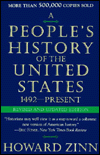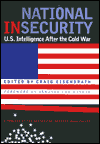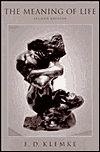| Click above, for articles in
this issue.
HISTORY

A People's History of the United
States
by Howard Zinn
ISBN: 0060926430
"Zinn has written a brilliant and moving history of the American
people from the point of view of those who have been exploited politically and
economically and whose plight has been largely omitted from most histories.
Extending its coverage... the book is an excellent antidote to establishment
history. Seldom have quotations been so effectively used; the stories of
blacks, women, Indians, and poor laborers of all nationalities are told in their
own words. While the book is precise enough to please specialists, it
should satisfy any adult reader." LIBRARY JOURNAL
"One of the most important books I have ever read in a long life
of reading... It's a wonderful, splendid book--a book that should be read by
every American, student or otherwise, who wants to understand his country, its
true history, and its hope for the future." HOWARD FAST
"The coming of World War II weakened the old labor militancy
of the thirties because the war economy created millions of new jobs at higher
wages. The New Deal had succeeded only in reducing unemployment from 13
million to 9 million. It was the war that put almost everyone to work,
and the war did something else: patriotism, the push for unity of all classes
against enemies overseas, made it harder to mobilize anger against the
corporations." (p. 393)
"The CIA now had to prove it was still needed. The NY
Times (Feb. 4, 1992) declared that 'in a world where the postwar enemy had
ceased to exist, the CIA and its handful of sister agencies, with their
billion dollar satellites and mountains of classified documents, must somehow
remain relevant in the minds of Americans.' The military budget remained
huge. The cold war budget of $300 billion was reduced by 7 percent to
$280 billion. The Chairman of the Joints Chief of Staff, Colin Powell,
said; 'I want to scare the hell out of the rest of the world. I don't
say that in a bellicose way." (p. 581)
POLITICAL
SCIENCE

National Insecurity
ed. by Craig
Eisendrath
ISBN: 1566397448
"This book should be required reading by all congressional
committees concerned with intelligence policy, surveillance, and appropriations,
and by all Americans." Sen. Tom Harkin, Foreword,
1999
When this book was written, the Cold War had been over for ten
years and no country threatened this nation's existence, yet, we still spent
billions of dollars on covert action and espionage. Even during the Cold War,
when intelligence was seen as a matter of life and death, our system served us
badly. It provided unreliable information (leading, among other things, to a
grossly inflated military budget) as it supported corrupt regimes around the
world, promoted the drug trade, and repeatedly violated foreign and domestic
laws. And worse, proceed in a shroud of secrecy, it paid no price for its
mistakes, but instead grew larger and more insulated and in drastic need of
reform.
Ten prominent experts describe, from an insider perspective, what
went wrong with U.S. intelligence and what needs to be done to fix it. Drawing
on their experience in government administration, research, and the foreign
service, they propose a radical rethinking of the United States' intelligence
needs in the post-Cold War world. In addition, they offer a coherent and unified
plan for reform that can protect U.S. Security while upholding the values of our
democratic system. Many of those recommendations resonate today as
predictors of the intelligence failures that helped create the conditions for
9-11.
The contributors include Roger Hilsman, former Assistant Secretary
of State, advisor to President Kennedy, and author of The Cuban Missile
Crisis; Melvin A. Goodman, former division chief and senior analyst at the
CIA's Office of Soviet Affairs; Robert E. White, former U.S. ambassador to El
Salvador and Paraguay and president of the Center for International Policy;
Robert V. Keeley, former ambassador to Greece, Zimbabwe, and Mauritius; Jack A.
Blum, chief investigator for Senator Church's Senate Foreign Relations Committee
and for the Senate investigation of the Iran-Contra scandal; Kate Doyle, analyst
at the National Security Archive; Alfred W. McCoy, author of The Politics of
Heroin; Robert Dreyfuss, a journalist who publishes regularly on
intelligence matters; Richard A. Stubbing, who for twenty years handled the
intelligence budget for the Office of Management and Budget; Pat M. Holt, former
chief of the Senate Foreign Relations committee and author of Secret
Intelligence and Public Policy; and the editor.
"What the Central Intelligence Agency has bequeathed to
our relations with Central America and the Caribbean is a string of
embarassing failures against inconsequential targets. From the overthrow
of the government of Guatemala to the Iran-Contra fiasco of the 1980's, the
CIA not only violated solemn treaties but allied us with the most violent,
reactionary elements of Latin American society. In carrying out these
operations, the CIA subverted American values at home as well as abroad...
Such policies were pursued without adequate safeguards of accountability that
characterize a democracy." (Robert White p. 45)
"Official intelligence dealings with criminals, especially
criminals who are involved in activity on U.S. territory, raise very difficult
questions. Who performs the cost-benefit analysis ? Who has the authority to
waive the enforcement of criminal laws ? Does the government have
responsibility for the effect of the sanctioned criminal activity ?" (Jack Blum, p. 88)
PHILOSOPHY

The Meaning of Life
ed. by E.D. Klemke
ISBN: 019512703X
A great anthology of essays that attempt to tackle one of the
"great questions" that has faced man since his arrival on Earth; what is the
meaning of life--why are we here ?
Professor Klemke, presents us with three avenues of explanation;
God as an answer; a non-theistic answer; and questioning the crux of the
question itself. Essays by Tolstoy, Reinhold Neibuhr and David Swenson
present God as the answer to man's existence and purpose.
Whereas Bertrand Russell, Huxley, Camus, Thomas Nagel, Paul
Edwards, Richard Taylor, Kurt Baier, and Klemke pose alternatives that span
existentialism, rationalism, humanism, each arriving at a nontheistic
alternative.
In the final group of essays by Kai Nielsen, Paul Edwards, R.M.
Hare, and W.D. Joske, they each examine the nature of the question
itself: is the question a legitimate one ?
A truly excellent compilation of essays that are sure to
engage you.
"On the highly particularized problems of giving meaning to an
individual life, philosophy may not have much to say: but it is certainly
concerned with what seems to be general threats to meaningfulness arising out
of the human situation as such. For the non theist, the chief
threat may well appear to come from the realization of mortality. The
relation between meaning and mortality is, as we have noted, a focus of
attention in current discussions. On the other side are writers (Tolstoy
is again among them--as Flew brings out) who in some contexts virtually
identify the question of meaningfulness with the question of immortality: deny
immortality and you necessarily deny meaningfulness. This account
plainly distorts the logic of the question about the meaning of life, not
least by reducing its complexity to a single issue of fact." (R.W. Hepburn, p.
217)
"If we see people as naked apes, we cannot but be cynical
concerning the superstructure of justification associated with many of the
most memorable human enterprises. Once we accept that many of our
political and military endeavors are the working out of a primitive instinct
of territoriality, we can no longer regard as fully meaningful the gloss of
reasoning and argument which men use in an attempt to show that their
undertakings are reasonable. The words of debate become mere persiflage;
the talk a mere epiphenomenon of creatures ignorant of the true springs of
their actions. We begin to undermine our faith in the capacity of human
beings to know the truth, discover what causes what, and learn, through
self-examination, about the integrity of their own motives." (W.D. Joske p.
257)
Posted June 01,
2005
URL: www.thecitizenfsr.org
SM
2000-2011
You are here: HOME page-OLDER ISSUES-JUNE 2005-Recommended Reading
Previous : In Retrospect Next : Words of Inspiration
|